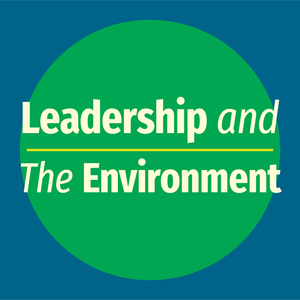018: Joshua Spodek: Enron Environmentalism (transcript)
Everybody I ask about the environment says that they value clean air, clean land clean water and yet virtually everybody, especially Americans, says that they pollute more than they have to. How do we explain this discrepancy between what people say that they value and how they actually behave? Today I’m going to talk about a concept called Enron environmentalism. It’s a concept or it’s a term that I came up with a little while ago. I first wrote about it in an Inc. article, I’ll put a link to it in the show notes. For context, I only read from a couple of papers and I’ll put links to them in the notes.

The Leadership and the Environment podcast
Here’s a paper from a journal called Energy Policy. It’s an academic peer-reviewed journal and they interviewed over a thousand people on data about residential energy use and things like that. Quoting from the results it says, “Results of the data analysis show that no significant difference is found between the impacts of environmentally aware and environmentally unaware consumers.†And so, quoting from the paper using their terms brown for the not environmentally aware vs super green, which is their term for the people who claim to be the most environmentally aware and the most environmentally active, both brown and super green consumers consume approximately the same amount of energy and produce approximately the same amount of carbon emissions. So, people who believe that they’re not emitting much are doing the same as the people who are.
Now here’s another journal Environment and Behavior Journal, also a peer-reviewed academic journal, also surveyed over a thousand people on quoting them, “per capita energy use and individual carbon footprints, pro environmental behavior†and things like that. And so, they find that environmental self-identity played an ambiguous role in predicting actual environmental impacts. Instead, environmental impacts were best predicted by people’s income level, not what they thought of themselves. This is the opposite of self-awareness. They believe that they are aware when they’re not.
How do we explain this discrepancy? This is where Enron environmentalism comes in. How did Enron look so profitable for so long? It’s easy. You take the company, divide it up into parts and in some parts put all the profits. That part looks really profitable. Put the losses into the other parts and act like they don’t exist. Act like they don’t count. Suddenly any company is hugely profitable because the losses don’t exist. Well, in your imagination that is. So, what’s Enron Environmentalism? Take your life, divide it up into parts, put all the stuff that you do that’s environmental and put that in one part. Act like that’s you. Now take all the not environmental behavior and put them into these other parts and act like they don’t exist. Act like they don’t count. Say, “Oh, I have to travel for work. I have to travel for family. You can tell me what to eat.†And suddenly you’re the most environmental person in the world. And that is Enron environmentalism.
I urge you to be aware of the concepts and if you care about the environment… Oh, yeah, I forgot to mention. After Enron, the accountants and the legal people went through to find where the money went and so they did their best to find the money that they could to return it to the people whose pensions were lost and the creditors and people like that. I’m sure that they found a bunch of the money but I’m sure they lost most of it. Here’s the deal about nature. Nature doesn’t lose track of a single molecule of pollution. Nature doesn’t lose track of a single jewel of energy, a single calorie of energy. It’s the perfect accountant. It doesn’t matter if you don’t believe that your behavior affects the environment. It does. It’s not your belief that nature reacts to, it’s your actual behavior. So that’s Enron environmentalism. If you’re an American, you probably practice Enron environmentalism. I urge you if you care about the environment, or for that matter, if you care about leadership or your own personal development because Enron environmentalism compartmentalizing is the opposite of integrity. Integrity is putting your life together and not treating it as different parts. So please be aware of the concept and I urge you not to be an Enron environmentalist if you care about the environment, if you care about leadership, if you care about your own personal growth.
Read my weekly newsletter

On initiative, leadership, the environment, and burpees